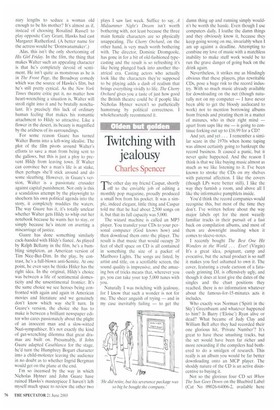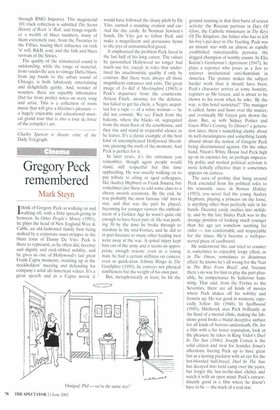Twitching with jealousy
Charles Spencer
The other day my friend Caspar, shortly off to the enviable job of editing a monthly pop magazine, proudly produced a small box from his pocket. It was a simple, indeed elegant, little thing and Caspar told me that he had about 2,500 songs on it, but that its full capacity was 5,000.
The wizard machine is called an MP3 player, You transfer your CDs to your personal computer (God knows how) and then download them onto the player. The result is that music that would occupy 20 feet of shelf space on CD is all contained in something the size of a packet of Marlboro Lights. The songs are listed, by artist and title, on a scrollable screen, the sound quality is impressive, and the amazing box of tricks means that, wherever you go, you can take your top 5,000 tunes with you.
Naturally I was twitching with jealousy, for I know that such a wonder is not for me. The sheer anguish of trying — and in my case inevitably failing — to get the damn thing up and running simply wouldn't be worth the hassle. Even though I use computers daily, I loathe the damn things and they obviously know it, because they keep going wrong on me, invariably when I am up against a deadline. Attempting to combine my love of music with a matchless inability to make stuff work would be to run the grave danger of going back on the drink again.
Nevertheless, it strikes me as blindingly obvious that these players, plus rewritable CDs, pose a huge risk to the record industry. With so much music already available for downloading on the net (though naturally not on my computer — I have never been able to get the bloody audiocard to work) not to mention borrowing albums from friends and pirating them in a matter of minutes, who in their right mind — apart from saps like me — is going to continue forking out up to £16.99 for a CD?
And yet, and yet . . I remember a similar scare in the 1970s when home taping was almost certainly going to bankrupt the record business. It caused a panic, but it never quite happened. And the reason I think is that we like buying music almost as much as we like listening to it. I've been known to stroke the CDs on my shelves with paternal affection. I like the covers (though LPs were better still), I like the way they furnish a room, and above all I like the informative pamphlets inside.
You'd think the record companies would recognise this, but most of the time they don't. I've written before about the way major labels opt for the most wearily familiar tracks in their pursuit of a fast buck on compilation albums, and most of them are downright insulting when it comes to sleeve-notes.
I recently bought The Best One Hit Wonders in the World . . Ever! (Virgin) It's a great idea, poignant, camp and evocative, but the actual product is so naff it makes you feel ashamed to own it. The cover, featuring a crude cartoon of a fatuously grinning DJ, is offensively ugly, and though it does at least give the dates of the singles and the chart positions they reached, there is no information whatever about the famous-for-15-minutes acts it includes.
Who exactly was Norman (Spirit in the Sky') Greenbaum and whatever happened to him? Is Barry (Eloise') Ryan alive or dead? What became of Judy Clay and William Bell after they had recorded their one glorious hit, 'Private Number'? It's great to have these smashing tracks, but the set would have been far richer and more rewarding if the compilers had bothered to do a smidgen of research. This really is an album you would be far better downloading onto an MCP player. The shoddy nature of the CD is an active disincentive to buying it.
Not so the glorious four CD set When The Sun Goes Down on the Bluebird Label (Cat No 09026-64006-2, available here through BMG Imports). This magisterial 101 track collection is subtitled The Secret History of Rock 'n' Roll, and brings together a wealth of blues numbers, many of them extremely rare, from the Twenties to the Fifties, tracing their influence on rock 'n' roll. R&B, soul, and the folk and blues revivals of the Sixties.
The quality of the remastered sound is outstanding, while the range of material, from vaudeville acts to vintage Delta blues, from jug bands to the urban sound of Chicago, is both fabulously entertaining and delightfully quirky. And, wonder of wonders, there are superbly informative (but far from prolix) notes on every song and artist. This is a collection of roots music that will give a lifetime's pleasure — a hugely enjoyable and educational musical grand tour that is also a tour de force of the compiler's art.
Charles Spencer is theatre critic of the Daily Telegraph.



































































































 Previous page
Previous page